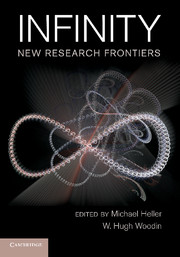Book contents
- Frontmatter
- Contents
- Contributors
- Preface
- Acknowledgments
- Introduction
- I Perspectives on Infinity from History
- II Perspectives on Infinity from Mathematics
- III Technical Perspectives on Infinity from Advanced Mathematics
- IV Perspectives on Infinity from Physics and Cosmology
- V Perspectives on Infinity from Philosophy and Theology
- 11 God and Infinity: Directions for Future Research
- 12 Notes on the Concept of the Infinite in the History of Western Metaphysics
- 13 God and Infinity: Theological Insights from Cantor's Mathematics
- 14 A (Partially) Skeptical Response to Hart and Russell
- Index
14 - A (Partially) Skeptical Response to Hart and Russell
Published online by Cambridge University Press: 07 June 2011
- Frontmatter
- Contents
- Contributors
- Preface
- Acknowledgments
- Introduction
- I Perspectives on Infinity from History
- II Perspectives on Infinity from Mathematics
- III Technical Perspectives on Infinity from Advanced Mathematics
- IV Perspectives on Infinity from Physics and Cosmology
- V Perspectives on Infinity from Philosophy and Theology
- 11 God and Infinity: Directions for Future Research
- 12 Notes on the Concept of the Infinite in the History of Western Metaphysics
- 13 God and Infinity: Theological Insights from Cantor's Mathematics
- 14 A (Partially) Skeptical Response to Hart and Russell
- Index
Summary
I want to suggest a way into the theological notion of infinity via the notion of “otherness,” or, if you prefer a more negative and restrained proposition, I want to suggest that there is a problem about how to speak of the divine infinity, one that connects with a problem about how to speak of the divine “otherness.” The chapters by Hart and Russell in this volume have ably shown how the “infinity” of God was historically a problem for Christian theologians, inheriting as they did Greek notions of the infinite as formless and vacuous “indeterminacy,” and both are right to emphasize the crucial role of Gregory of Nyssa in generating a notion of the divine infinity that allows us to speak non-oxymoronically of God as “infinite perfection.” Not wishing to rehearse that historical question – I could neither want nor hope to match the brilliant lucidities of either's chapter – my concern is rather with how that same problem with which early Christian theologians were faced about divine infinity recurs for us today in connection with general notions of “otherness.” Furthermore, we can see in what way there is a problem – as in general terms arising out of our ordinary conceptions of “otherness” – from the following objection to the proposition that God is “infinite” found in Thomas Aquinas's Summa Theologiae (ST Ia, q7, a1, obj3). The objection goes like this:
What exists in such a way as to be “here” and not “there” is finite in respect of place. […]
- Type
- Chapter
- Information
- InfinityNew Research Frontiers, pp. 290 - 298Publisher: Cambridge University PressPrint publication year: 2011
- 1
- Cited by



